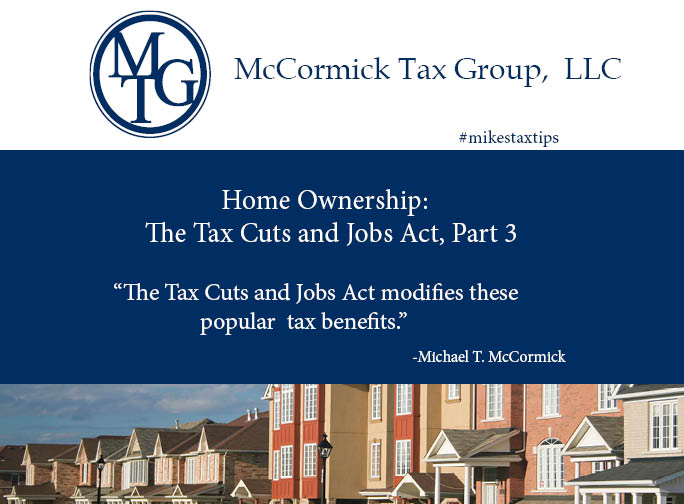Another big question coming from many clients regarding the new Act’s effect on their returns is about home ownership. Traditionally, tax law provides numerous incentives for home ownership by allowing the deduction for mortgage interest and real estate tax. The Tax Cuts and Jobs Act modifies these popular tax benefits.
Mortgage Interest
Home mortgage interest is generally deductible if it is paid or accrued on acquisition indebtedness or home equity indebtedness secured by any qualified residence of the taxpayer (i.e., the taxpayer’s principal or second residence). The deduction for acquisition indebtedness is limited to interest paid on the first $1 million of debt ($500,000 for a married taxpayer filing a separate return) and the first $100,000 on home equity loans ($50,000 for a married taxpayer filing a separate return). Under the Tax Cuts and Jobs Act, a taxpayer may treat no more than $750,000 as acquisition indebtedness ($375,000 in the case of married taxpayers filing separately) for tax years beginning after December 31, 2017, and before January 1, 2026. It should be noted that the reduced amounts for application of the acquisition indebtedness do not apply to any indebtedness incurred on or before December 15, 2017. Therefore, a taxpayer who purchased their home on or before December 15, 2017, may continue to deduct interest paid on the first $1 million of debt ($500,000 for a married taxpayer filing a separate return).
The rules for re-financing and home equity loans are slightly modified as well. The Tax Cuts and Jobs Act suspends the deduction for interest on home equity indebtedness. Therefore, for tax years beginning after December 31, 2017, a taxpayer may not claim a deduction for interest on home equity indebtedness. The suspension ends for tax years beginning after December 31, 2025. Special rules apply in the case of indebtedness from refinancing existing acquisition indebtedness. Specifically, the $1,000,000 ($500,000 in the case of married taxpayers filing separately) limitation continues to apply to any indebtedness incurred on or after December 15, 2017, to refinance qualified residence indebtedness incurred before that date to the extent the amount of the indebtedness resulting from the refinancing does not exceed the amount of the refinanced indebtedness. Thus, the maximum dollar amount that may be treated as principal residence acquisition indebtedness will not decrease by reason of a refinancing. For tax years beginning after December 31, 2025, a taxpayer may treat up to $1,000,000 ($500,000 in the case of married taxpayers filing separately) of indebtedness as acquisition indebtedness, regardless of when the indebtedness was incurred.
Real Estate Tax
The Tax Cuts and Jobs Act provides that for tax years beginning after December 31, 2017, and beginning before January 1, 2026, a taxpayer may claim an itemized deduction of up to $10,000 ($5,000 for a married taxpayer filing a separate return) for the total amount of
- state and local property taxes not paid or accrued in carrying on a trade or business, and
- state and local income (or sales taxes in lieu of income taxes) for the tax year.
Foreign real property taxes cannot be deducted under this exception.
For many taxpayers this is the downside of the new Act. Where it provides many benefits in other areas of the Code, home ownership is a bit more restricted then in prior years.
If you missed Tax Cuts and Jobs Act, Part 2: Pass-Through Income Dededuction, check it out here!

